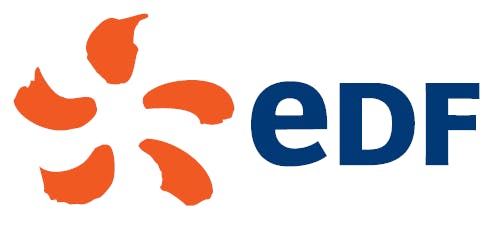EDF installed capacity and output in mainland France – 2022

This diagram shows the EDF installed capacity and output in mainland France - 2022.
86,465MW
Thermal(2): 4,945MW (6%)
Hydropower(1): 20,144MW (23%)
Wind: 6MW
Nuclear: 61,370MW (71%)
Expressed in megawatts of maximum capacity linked to the network.
(1) Excluding Corsica and overseas departments, i.e. 439MW in 2022, including sea energy: 240MW.
(2) Excluding Corsica and overseas departments, i.e. 1,567MW in 2022.

This diagram shows the EDF installed capacity and output in mainland France - 2022.
322.7TWh
Thermal(2): 11.2TWh (3.5%)
Hydropower(1)(2): 32.4TWh (10%)
Wind: 0.01TWh
Nuclear: 279.0TWh (86.5%)
(1) Excluding Corsica and overseas departments, i.e. 1.5TWh in 2022.
(2) Generation including pumped storage consumption.
(3) Excluding Corsica and overseas departments, i.e. 4.9TWh in 2022.
NB: figures are rounded.
1.4.1.1 Nuclear power generation
1.4.1.1.1 The excell plan
The “excell” plan, launched in the spring of 2020, aims at enabling the French nuclear industry to return to a high standard of quality and excellence so as to take on existing and future major projects in France, the United Kingdom, and elsewhere in the world. The excell plan also benefits existing the nuclear fleet programmes, in particular Grand Carénage and related maintenance operations.
In November 2021, the EDF group and the nuclear industry made 30 public commitments, divided into 5 major focus areas (governance, skills, manufacturing and assembly, supply chain, and standardization). As of the end of 2022, 27 of these commitments had been achieved; in some cases, the target has been exceeded (1). These commitments are now being applied on the ground on a daily basis. The remaining three especially demanding commitments have been partially met and will be fully achieved during the course of 2023. The full list of commitments is available at the following address: https://www.edf.fr/plan-excell (2).
The excell plan is now entering a new phase, aimed at enduringly embedding its principles in the Company. This aims to enable EDF and its industrial environment for new nuclear projects and the existing fleet to be better served.
In 2022, achievements were seen in all five major strands:
Governance of nuclear projects
The governance of nuclear projects has been strengthened by establishing a "Large projects control" (LPC). This aims to provide an ongoing picture of project maturity, backed by comparative analysis of the project and LPC. Each project undertaken is subject to a quarterly review chaired by the Chairman of EDF. The creation in July 2022 of the management structure for the New Nuclear (France) programme comprises the last part of the response to the recommendations in the report by Jean-Martin Folz (3) (see also section 1.4.1.1.3.2).
Skills
In respect of skills, a Job and Skills Development Commitment (EDEC) has been put in place across the industry with the result that all data necessary to coordinate skills development was made available in 2022. The MATCH programme run by GIFEN (4) provides this annual coordination and informs the work of the Nuclear Industry University (UMN). The UMN was set up in April 2021 to provide fresh impetus for training projects. In 2022, it continued to boost training initiatives in French regions to ensure available, appropriate resources in the long term. The monavenirdanslenucleaire.fr website provides access to almost 2,000 training courses.
Manufacturing and assembly
Major work has been carried out for manufacturing and assembly, in close liaison with companies working in this sector. This has involved defining standards forming the foundations of a return to excellence and “right first time” manufacturing. The standards were rolled out in 2022 with contracts being more focused on partnership between EDF and its suppliers. At the same time, optimised, digitalised monitoring by EDF was deployed. There was a special focus on support for upskilling and capacity-building for key suppliers for the EPR2 project. This “supplier development” mission was entrusted to experienced operational personnel from the aerospace industry. Thirty-four companies in the sector are ISO 19443 certified; 50 others are in the process of being certified.
Supply chain
The quality of the relationships between EDF and its suppliers is central to the success of work on the existing fleet and for new projects. In consultation with companies in the sector, a toolbox featuring new supplier consultation and selection methods has been deployed. This encourages supplier proposals of good technical quality and places an emphasis on their expertise. It uses measures offering financial incentives and better risk-sharing in order to achieve better alignment of interests and successful contracts. An annual survey monitors feedback from suppliers and allows the progress and relevance of such measures to be evaluated.
Standardization
Standardization and replication are vital to achieve quality, which itself helps ensure safety. Mandatory practice catalogues (catalogues d’usage obligatoire, CADO) are now required for the technical design of systems. These aim to reduce the diversity of equipment used and improve efficiency. Another benefit of standardisation is that selected contractors will have more business. This enables them to invest in continuous quality improvement. It also simplifies and rationalises the technical documentation applicable to contracts and the documentation required from suppliers. Systematic replication of tried and tested equipment and systems, especially critical systems, is also a key factor in mitigating project risk and improving project management.
The welding plan aims to eliminate non-quality risk factors from end to end. The Higher School of Welding Training (HEFAÏS) in Cherbourg had its first intake in September 2022. Accreditation of welders and the improved quality of controls and of welding works are among the aspects co-built with industry contractors with a view to “welding right first time”.
(1) See the EDF press release of 15 November 2022, “The excell plan presents its annual results and outlook for the sustainability of its standards”.
(2) See also section 3.4.3.2.1 “The excell plan: being present in major nuclear power projects".
(3) Report on the construction of the Flamanville EPR delivered to the French Minister for the Economy and Finance and the Chairman and CEO of EDF in October 2019.
(4) Gifen: French Nuclear Energy Industry Group.
